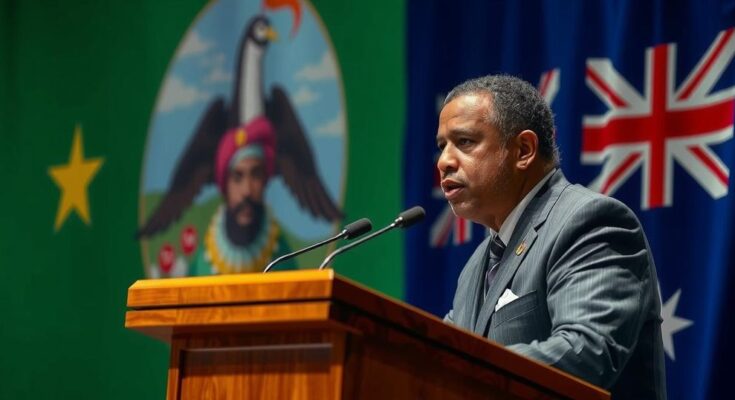Ralph Regenvanu, Vanuatu’s Special Envoy for Climate Change, criticized major emitters such as Australia and the US during the ICJ climate hearings. He condemned their reliance on outdated treaties and failure to curb emissions, emphasizing the need for legal accountability and immediate action against climate change impacts, which violate international law.
During the International Court of Justice (ICJ) climate hearings in The Hague, Vanuatu’s Special Envoy for Climate Change, Mr. Ralph Regenvanu, criticized major polluters, including Australia and the United States, for their lack of effective action against climate change. Regenvanu emphasized that these nations often utilize outdated treaties as a shield against accountability, thereby hindering global efforts to mitigate emissions. He underscored the necessity for immediate legal recognition of the impacts of climate change as a breach of international obligations.
Expressing palpable disappointment with the major greenhouse gas emitters, Regenvanu remarked, “We are obviously disappointed by the statements made by the governments of Australia, the United States, Saudi Arabia, and China during the ICJ proceedings.” He articulated that the reliance on existing treaties has regrettably failed to bring about the required reductions in emissions, ultimately impacting vulnerable nations like Vanuatu.
Vanuatu’s position in the ICJ argues that climate change repercussions contravene international law encompassing human rights and environmental protections. Regenvanu asserted, “The destruction of Earth’s climate system constitutes an ongoing breach of international law, and it demands immediate legal recognition and cooperative measures to turn the tides.” He highlighted the importance of support from historically colonial powers such as France and the United Kingdom in fostering justice and accountability.
Furthermore, Regenvanu called upon all nations, particularly those with significant historical responsibilities and capacities, to realign their actions with the principles of international law and urgent planetary needs. He proclaimed, “The time for decisive, legally grounded action is now,” reflecting an urgent plea for global collaboration to address the escalating climate crisis.
Vanuatu, a small island nation in the South Pacific, is on the front lines of climate change, facing rising sea levels and extreme weather conditions. The ongoing discussions at the International Court of Justice concerning climate change highlight the legal responsibilities of major emitting nations. As a vulnerable nation reliant on international aid, Vanuatu is advocating for stronger commitments from larger countries to reduce emissions and acknowledge their role in global climate crisis management. This case represents a critical moment for international climate law and human rights, as it underscores the intersection between environmental integrity and legal accountability.
In summary, the recent statements by Vanuatu’s Special Envoy for Climate Change highlight the pressing need for major emitters to take urgent and accountable action against climate change. Regenvanu has called for a reevaluation of existing international treaties and for nations to recognize their responsibilities under international law. The urgency of the climate crisis necessitates cooperation and a collective commitment to drive tangible change, particularly from historically industrialized nations.
Original Source: islandsbusiness.com




